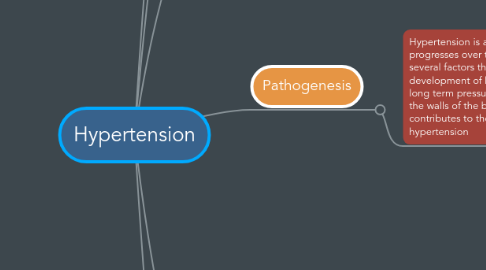
1. Clinical Manifestations
1.1. Even with a dangerously high blood pressure reading some people may not present with any symptoms. However some symptoms that may occur with hypertension include:
1.1.1. Shortness of breath
1.1.2. Nosebleeds
1.1.3. Headaches
2. Risk Factors
2.1. Age
2.1.1. Risk of hypertension increases with age
2.2. Race
2.2.1. Hypertension is more common in African Americans
2.3. Family History
2.3.1. You are more likely to get hypertension if others in your family have had it
2.4. Obesity
2.4.1. The more you weigh the more blood your body needs - higher blood volume leads to increased blood pressure
2.5. Tobacco
2.5.1. The chemicals in tobacco products can damage your arteries leading to increased blood pressure
2.6. Chronic Conditions
2.6.1. Some chronic diseases such as diabetes and kidneys diseases can cause hypertension
3. Incidence Prevalence
3.1. The amount of Americans with elevated blood pressure is estimated to be around 103 million (2018)
3.2. Hypertension is one of the leading causes of cardiovascular disease which is the main cause of death world wide
3.3. Hypertension is more prevalent in African Americans
3.4. Hypertension is more common in males until women hit their mid 60s then it’s more common for them to develop the condition
4. Pathogenesis
4.1. Hypertension is a condition that progresses over time. There are several factors that lead to the development of hypertension. The long term pressure blood exerts on the walls of the body’s arteries contributes to the progression of hypertension
4.1.1. The Renin Angiotensin Aldosterone System (RAAS) controls blood pressure in multiple ways. Renin is released from the kidneys and activates angiotensinogen which becomes angiotensin 1. Angiotensin Converting Enzyme (ACE) turns angiotensin 1 into angiotensin 2. Angiotensin 2 has many effects that include:
4.1.1.1. Vasoconstriction of arterioles which increases blood pressure
4.1.1.2. Increased sympathetic activity: increases heart rate and blood pressure
4.1.1.3. Tells kidneys to reabsorb sodium. Water follows sodium so there is an increase in water retention. More water in the vascular system increases blood volume which increases blood pressure
4.1.1.4. Stimulates adrenal gland to release aldosterone which increases water retention
4.1.1.5. Stimulates the pituitary gland to secrete antidiuretic hormone (ADH) which increases water retention
5. Treatments
5.1. Medications to Stop RAAS Cycle
5.1.1. Direct Renin Inhibitors: with this medication angiotensinogen can not be activated to become angiotensin 1
5.1.1.1. Alscarin
5.1.2. ACE inhibitors: this medication stops ACE from converting angiotensin 1 into angiotensin 2
5.1.2.1. Lisinopril, Benazapril, Catopril
5.1.3. Aldosterone Antagonists: keep aldosterone from acting on the kidneys and are potassium sparing
5.1.3.1. Antimineralocorticoid
5.1.4. Vasodilators: counter the vasoconstriction caused by angiotensin 2
5.1.4.1. Hydralazine
5.1.5. Beta Blockers: counter the increase in sympathetic nervous system
5.1.5.1. Propranolol, Atenolol
5.1.6. Angiotensin 2 Receptor Blockers: prevent angiotensin 2 from being received by its target organs
5.1.6.1. Candesartan, Losarton
5.2. Other Medications
5.2.1. Thiazide Diuretics: these act on your kidneys to help you eliminate sodium and water which reduces blood volume and therefore blood pressure
5.2.2. Calcium Channel Blockers: these help relax the muscles of your blood vessels which lowers blood pressure
5.2.2.1. Amlodipine, Diltiazem
5.3. Lifestyle Changes
5.3.1. Diet: eating a healthy balanced diet and consuming less salt can help reduce blood pressure
5.3.2. Physical Activity: an increase in physical activity can help reduce blood pressure. Exercise makes your heart stronger which can decrease the force your blood exerts on your arteries
5.3.3. Alcohol: regular alcohol consumption can increase the amount of lipids in the blood stream which can damage your arteries leading to increased blood pressure
6. Diagnostics
6.1. Hypertension is diagnosed by assessing the blood pressure of the patient. There are varying degrees of hypertension which are categorized by stages:
6.1.1. Stage 1: Systolic 130 - 139 mmHg Diastolic 80 - 89 mmHg
6.1.2. Stage 2: Systolic 140+ mmHg Diastolic 90+ mmHg
6.1.3. Hypertensive Crisis: Systolic 180+ mmHg Diastolic 110+ mmHg
